
Diabetic Retinopathy Treatment
What is Diabetic Eye Disease?
Eye problems as a result of complications of diabetes are called diabetic eye diseases.
Problems with diabetic eye disease:
• Diabetic Retinopathy: Damaged veins on the retinal network layer.
• Cataract: The ocular lens gets blurred and loses the opacity. Cataract is seen at the early ages with the diabetes patients.
• Glaucoma: Increasing intraocular pressure and damaging the visual nerves. People with diabetes has the double risk of glaucoma.
Diabetic retinopathy is a complication related to diabetes that affects a person’s vision. The cause of diabetic retinopathy is the damaged blood vessels of the retina. If you have diabetes, you are a natural and potential candidate for diabetic retinopathy. Without treatment, it may lead to vision loss or blindness.
In the beginning, diabetic retinopathy shows no symptoms and may cause only mild vision problems. The treatment of diabetic retinopathy is necessary when it reaches a point where starts to affect your vision and your vision at risk. This condition can develop in any person who either has type 1 diabetes or type two.
In this article first, we will mention diabetic retinopathy symptoms and types of diabetic retinopathy treatment. You will also find out from the article the answers to some frequently asked questions about diabetic retinopathy treatment.
Diabetic Retinopathy SymptomsThere are different types of diabetic retinopathy symptoms. Diabetes may cause many eye diseases like cataracts, glaucoma, and diabetic retinopathy. It is hard to notice the symptoms of diabetic retinopathy in the early stages because it usually doesn’t send any clear signal to the body until it reaches an advanced level. In this period symptoms can come and go. Some symptoms of diabetic retinopathy can be lined up as below:
- Blurred vision
- Poor night vision
- Sudden vision lost
- Small dark spots or streaks in your vision
- Trouble reading a book, newspaper, etc.
- Trouble seeing objects that are far away
- Seeing colors as faded
An eye doctor can diagnose diabetic retinopathy via some exams. They check the subject such as the visual activity, pupil response, peripheral vision, and eye muscle function. During these exams, medical experts want to see if blood vessels are abnormal or not, and if you have retina swelling or bleeding in the center of the eye.
Types of Diabetic Retinopathy TreatmentThere are many factors which treatment is suitable for you, before starting the procedure. Your doctor will consider your age, lifestyle, medical past, level of retinal damage, visual acuity, and HgbA1c (A measure of sugar)
Treatment of diabetic retinopathy starts at an advanced level. There are different types of diabetic retinopathy treatment:
- Laser treatment: In laser treatment for diabetic retinopathy, it is aimed to stop the growth of new blood vessels at the back of the eye.
- Eye injections: They are done to treat severe maculopathy that's threatening the patient’s sight. anti-VEGF injections are given into your eyes.
- Steroid eye implants: Steroid eye implants are used to treat diabetic retinopathy if eye injections do not work for you or are not suitable for you.
- Eye surgery: If diabetic retinopathy is at an advanced level and laser treatment is not possible, blood or scar tissue is removed from the eye by a surgical procedure. Your surgeon may recommend a vitrectomy surgery to treat advanced diabetic retinopathy.
You may want to know many and ask many things about diabetic retinopathy treatment. You are not alone. Many people are asking about it. Here you can read some FAQ about diabetic retinopathy treatment:
- Are different types of diabetic retinopathy treatments: Yes, depending on the patient’s condition, and the severity of the disease, the treatment methods may vary.
- How to prevent diabetic retinopathy?: Strong control of blood glucose levels can be a good start, as well as blood pressure and cholesterol levels.
- Are the treatments of diabetic retinopathy bring a permanent solution to the disease?: No, although the treatments are very helpful and reduce the symptoms, still we do not have a permanent solution for diabetic retinopathy, especially in advanced levels like proliferative retinopathy.
- Is the level of disease degree the same for both eyes and treatment changes accordingly?: In the beginning, usually, one eye is affected more than the other but we can not say the expert does not care about the healthier eyeless.
Some people are at higher risk of diabetic retinopathy:
- People, who have uncontrolled blood sugar levels
- Pregnants
- Regular smokers
- Chronic diabetics
- Pregnants
- People who have high blood pressure
Damage of diabetic retinopathy is permanent, but some treatments are effective bring the patient’s vision partly back.
So, what are the best ways to manage diabetic retinopathy?
If you have diabetes, do not neglect your annual visit and control to your ophthalmologist and your optometrist. The best and first thing to do is that. Early diagnosis of diabetic retinopathy is extremely important to avoid vision loss.
OUR DOCTORS
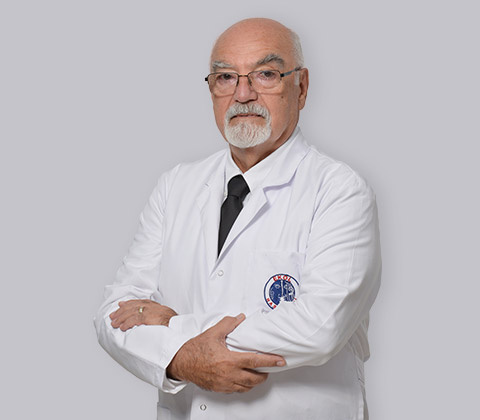 He was born in Ankara in 1945. He attended TED Ankara College, İzmir Bornova Anatolian High School and Ege University, Faculty of Medicine between 1963 and 1969, respectively. Upon his graduation, he started his specialization at Ege University, Faculty of Medicine, Eye Diseases Department and assumed the title of Eye Diseases Specialist in 1971. Between 1974 and 1975, he performed his military service as an ophthalmologist in Hatay Military Hospital in İzmir. After that, he was educated on Retinal Diseases and Lasers in Ophthalmology Clinic of the Faculty of Medicine at University of Gant, Belgium for 1 year. In 1977, he assumed the title of Associate Professor of Ophthalmology, and he founded and operated Retina and Contact Lenses units in Ege University, Faculty of Medicine, Department of Eye Diseases. In 1982 he became a Professor of Eye Diseases. Between 1992 and 2000, he served as the Head of Department of Eye Diseases, Faculty of Medicine, Ege University. In the meantime, he published 3 books and more than 150 domestic and foreign scientific papers, and about 170 papers in national and international congresses. He is married to Dr. Nigar Erbakan and has two sons.
He was born in Ankara in 1945. He attended TED Ankara College, İzmir Bornova Anatolian High School and Ege University, Faculty of Medicine between 1963 and 1969, respectively. Upon his graduation, he started his specialization at Ege University, Faculty of Medicine, Eye Diseases Department and assumed the title of Eye Diseases Specialist in 1971. Between 1974 and 1975, he performed his military service as an ophthalmologist in Hatay Military Hospital in İzmir. After that, he was educated on Retinal Diseases and Lasers in Ophthalmology Clinic of the Faculty of Medicine at University of Gant, Belgium for 1 year. In 1977, he assumed the title of Associate Professor of Ophthalmology, and he founded and operated Retina and Contact Lenses units in Ege University, Faculty of Medicine, Department of Eye Diseases. In 1982 he became a Professor of Eye Diseases. Between 1992 and 2000, he served as the Head of Department of Eye Diseases, Faculty of Medicine, Ege University. In the meantime, he published 3 books and more than 150 domestic and foreign scientific papers, and about 170 papers in national and international congresses. He is married to Dr. Nigar Erbakan and has two sons. 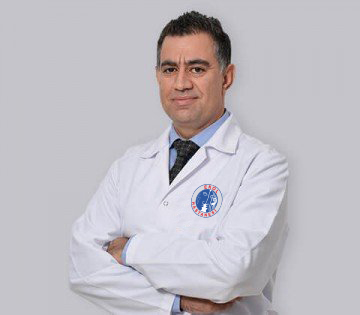 Dr Esat Çınar was born in Diyarbakır in 1976. He started İstanbul University, Faculty of Medicine in 1997 and graduated in 2003. He completed his speciality degree between 2003 and 2009 at İzmir Ege University, Faculty of Medicine, Ophthalmology Department. He was in charge of Glaucoma and Cornea Departments as a Deputy Associate Professor in İzmir University Hospital Faculty of Medicine, Department of Ophthalmology. He studied “Keratoplasty” in Ege University, Faculty of Medicine for 6 months (also known as “eye transplant”). He also was in charge of the controls of the premature babies’ in İzmir University Ophthalmology Department. He attended the course for vivisection both in clinical and laboratory fields for one month. His special interests are; Cataract surgery (multifocal, trifocal and thoric intraocular lenses), Cataract surgery with laser (Femtosecond Cataract), Keratoplasty, glaucoma surgery (non-penetrant surgeries such as viscocanalostomy, deep sclerotomy), Excimer Laser Surgeries (Lasik, Lasek, PRK), medical retinal diseases. He has many published articles in international indexes. He has many verbal and written presentations in national and international scientific meetings. He is an active member of the Turkish Association for Ophthalmology. He speaks fluent English and has one child.
Dr Esat Çınar was born in Diyarbakır in 1976. He started İstanbul University, Faculty of Medicine in 1997 and graduated in 2003. He completed his speciality degree between 2003 and 2009 at İzmir Ege University, Faculty of Medicine, Ophthalmology Department. He was in charge of Glaucoma and Cornea Departments as a Deputy Associate Professor in İzmir University Hospital Faculty of Medicine, Department of Ophthalmology. He studied “Keratoplasty” in Ege University, Faculty of Medicine for 6 months (also known as “eye transplant”). He also was in charge of the controls of the premature babies’ in İzmir University Ophthalmology Department. He attended the course for vivisection both in clinical and laboratory fields for one month. His special interests are; Cataract surgery (multifocal, trifocal and thoric intraocular lenses), Cataract surgery with laser (Femtosecond Cataract), Keratoplasty, glaucoma surgery (non-penetrant surgeries such as viscocanalostomy, deep sclerotomy), Excimer Laser Surgeries (Lasik, Lasek, PRK), medical retinal diseases. He has many published articles in international indexes. He has many verbal and written presentations in national and international scientific meetings. He is an active member of the Turkish Association for Ophthalmology. He speaks fluent English and has one child. 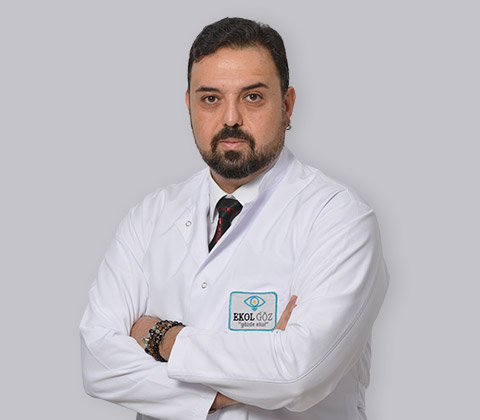 He was born in Izmir, in 1971. He attended summer school at Mids School of English, Eastbourn, England for learning a foreign language while he was in Bornova Anatolian High School and graduated with a high degree. He started his medical education at Ege University and continued with his specialization at JL Uni-Giessen, Germany, where he had the chance of working peer to peer with names such as Prof. Dr. Karl W. Jacobi, Prof Dr. Herbert Kaufmann, Prof. Dr. S. Pavlovic. Then, he found the opportunity to further his education in the field of refractive surgery by working with the most important names, such as Prof. Dr. T. Kohnen, JWG Uni-Frankfurt, Prof. Dr. I. Pallikaris, University of Crete, Prof Dr. Mahmut Kaşkaloğlu, Ege University Faculty of Medicine and Kaşkaloğlu Eye Hospital. Besides, he did scientific studies about medical glaucoma treatment, which is his other field of interest, with Ass. Prof. Dr. Karl Georg Schmidt, CGC Uni-Dresden. He is a member of DOG, ESCRS, ISRS of the AAO and TOD. He is married and has one child.
He was born in Izmir, in 1971. He attended summer school at Mids School of English, Eastbourn, England for learning a foreign language while he was in Bornova Anatolian High School and graduated with a high degree. He started his medical education at Ege University and continued with his specialization at JL Uni-Giessen, Germany, where he had the chance of working peer to peer with names such as Prof. Dr. Karl W. Jacobi, Prof Dr. Herbert Kaufmann, Prof. Dr. S. Pavlovic. Then, he found the opportunity to further his education in the field of refractive surgery by working with the most important names, such as Prof. Dr. T. Kohnen, JWG Uni-Frankfurt, Prof. Dr. I. Pallikaris, University of Crete, Prof Dr. Mahmut Kaşkaloğlu, Ege University Faculty of Medicine and Kaşkaloğlu Eye Hospital. Besides, he did scientific studies about medical glaucoma treatment, which is his other field of interest, with Ass. Prof. Dr. Karl Georg Schmidt, CGC Uni-Dresden. He is a member of DOG, ESCRS, ISRS of the AAO and TOD. He is married and has one child. 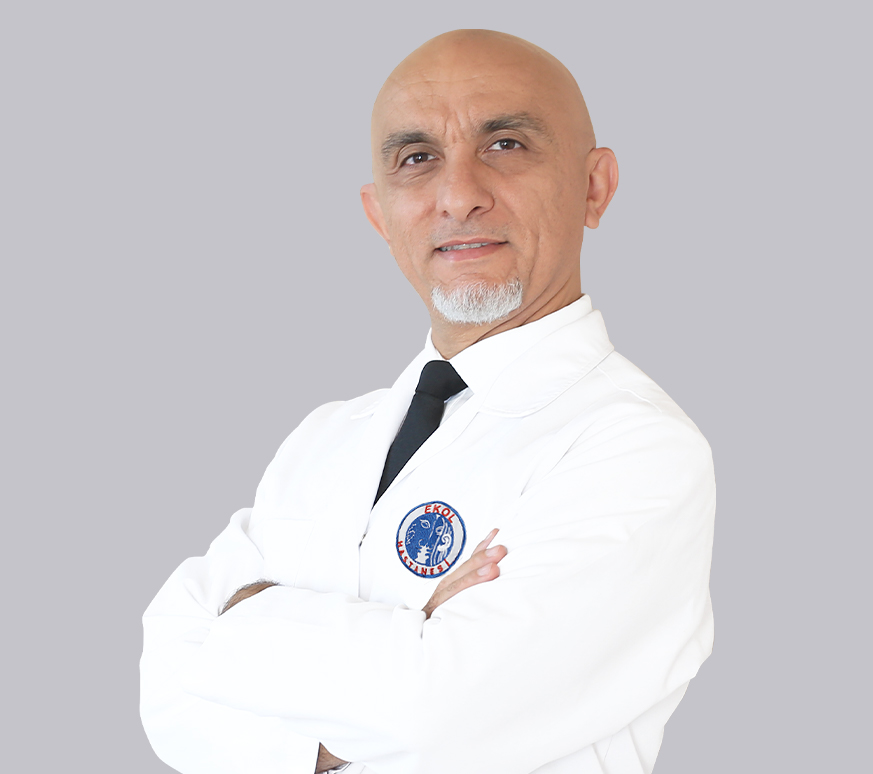 He graduated from Hacettepe University Faculty of Medicine in 1998. He completed his speciality in İzmir Dokuz Eylül University Faculty of Medicine Department of Eye Diseases between 1998 and 2002. He studied Retinal Surgeries in Munich Ludwig – Maximillian University Faculty of Medicine, Department of Eye Diseases. Special Interests: Cataract Surgeries (Multifocal, Trifocal, Toric Intraocular Lenses), Laser Cataract Surgeries (Femtosecond, Laser Cataract), Excimer Laser Surgeries (Lasik, Lasek, PRK) and Medical & Surgical Retinal Surgeries, Eyelid Surgeries. He has many articles published which were also scientifically indexed. He has oral and poster presentations in national & international science meetings. He is an active member of Turkish Society of Ophthalmology. He speaks English & German well, and married with 2 children.
He graduated from Hacettepe University Faculty of Medicine in 1998. He completed his speciality in İzmir Dokuz Eylül University Faculty of Medicine Department of Eye Diseases between 1998 and 2002. He studied Retinal Surgeries in Munich Ludwig – Maximillian University Faculty of Medicine, Department of Eye Diseases. Special Interests: Cataract Surgeries (Multifocal, Trifocal, Toric Intraocular Lenses), Laser Cataract Surgeries (Femtosecond, Laser Cataract), Excimer Laser Surgeries (Lasik, Lasek, PRK) and Medical & Surgical Retinal Surgeries, Eyelid Surgeries. He has many articles published which were also scientifically indexed. He has oral and poster presentations in national & international science meetings. He is an active member of Turkish Society of Ophthalmology. He speaks English & German well, and married with 2 children. 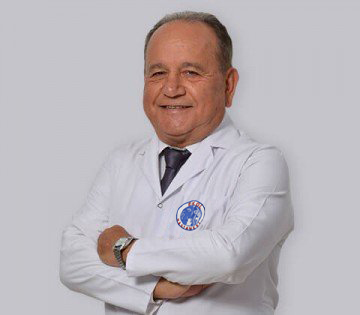 He graduated from Istanbul University, Faculty of Medicine and completed his specialty training in S.S.K Istanbul Hospital in 1984. He worked at Çanakkale State Hospital between 1984 and 2007. After 2007, he worked in private sector health units. He is an active member of The Turkish Ophthalmology Association and American Cataract and Refractive Association. Anterior segment (cataract) medical retina, glaucoma and contact lens are his areas of interest. He has a good command of English.
He graduated from Istanbul University, Faculty of Medicine and completed his specialty training in S.S.K Istanbul Hospital in 1984. He worked at Çanakkale State Hospital between 1984 and 2007. After 2007, he worked in private sector health units. He is an active member of The Turkish Ophthalmology Association and American Cataract and Refractive Association. Anterior segment (cataract) medical retina, glaucoma and contact lens are his areas of interest. He has a good command of English. 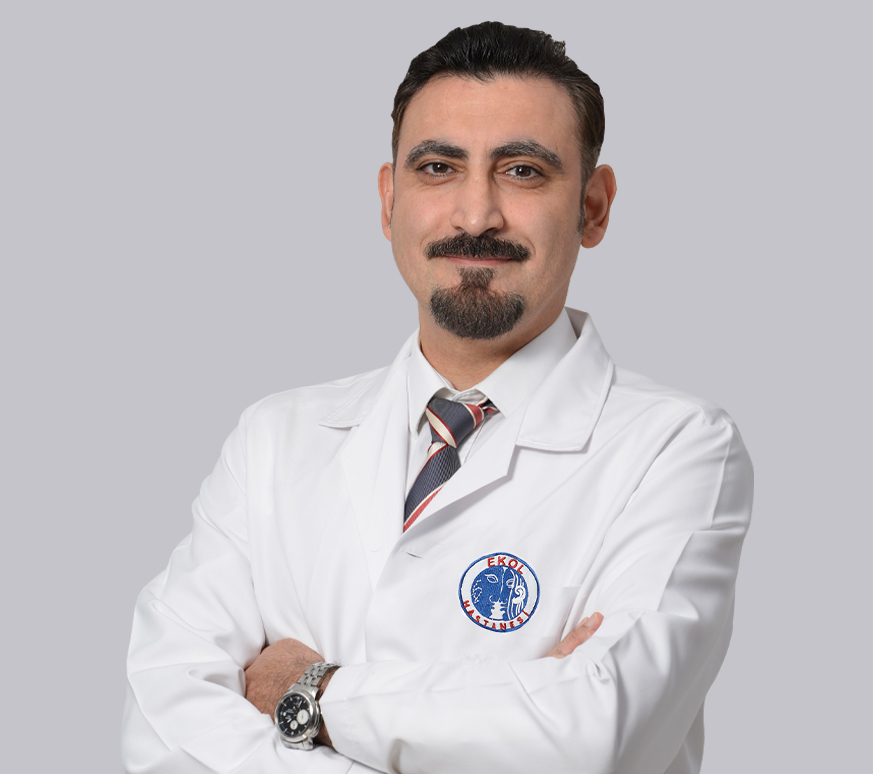 He was born in 1977. He graduated from Ege University. Fields of Interest: Cataract Surgery (Monofocal, Multifocal, Trifocal, EDOF, Toric Lenses) Excimer Laser (Femtosecond LASIK, PRK, No-Touch) ICL Keratoconus - Crosslink, Hard Contact Lens Application, Intrastromal Corneal Ring Strabismus Surgery Oculoplastic Surgery (Eyelid Aesthetic Surgery, Ectropium, Entropium, Ptosis, Probing, Tear Duct Obstruction) Pterygium Surgery (with Autograft) Glaucoma Medical and Laser Therapy Retinal Diseases (Intraocular Drug Injections, Diabetic Retinopathy, Yellow Spot Disease, Retinal Tears) Soft Contact Lens Inspection and Application He is a member of Turkish Association of Ophthalmology. He is married.
He was born in 1977. He graduated from Ege University. Fields of Interest: Cataract Surgery (Monofocal, Multifocal, Trifocal, EDOF, Toric Lenses) Excimer Laser (Femtosecond LASIK, PRK, No-Touch) ICL Keratoconus - Crosslink, Hard Contact Lens Application, Intrastromal Corneal Ring Strabismus Surgery Oculoplastic Surgery (Eyelid Aesthetic Surgery, Ectropium, Entropium, Ptosis, Probing, Tear Duct Obstruction) Pterygium Surgery (with Autograft) Glaucoma Medical and Laser Therapy Retinal Diseases (Intraocular Drug Injections, Diabetic Retinopathy, Yellow Spot Disease, Retinal Tears) Soft Contact Lens Inspection and Application He is a member of Turkish Association of Ophthalmology. He is married. 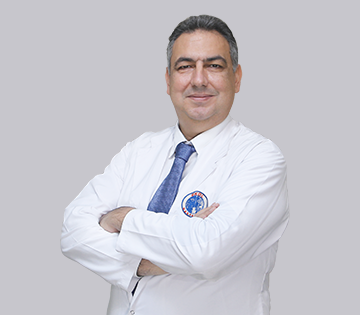 Dr. Kaan Okan Erdem was born in İzmir, in 1968. He finished middle school in Private İzmir Türk College and high school in Atatürk High School. He studied medicine in Selçuk University Faculty of Medicine. He is an active member of European Association of Cataract and Refractive Surgery, European Association of Ophthalmic Plastic and Reconstructive Surgery. He is interested in cataract, refractive surgery, oculoplastic and reconstructive surgery (upper and lower eyelids, tumour removals around the eye, entropium, ectropium ptosis, blepharoplasty), eye ultrasound, medical retinal and glaucoma. He speaks fluent English and married with 2 children.
Dr. Kaan Okan Erdem was born in İzmir, in 1968. He finished middle school in Private İzmir Türk College and high school in Atatürk High School. He studied medicine in Selçuk University Faculty of Medicine. He is an active member of European Association of Cataract and Refractive Surgery, European Association of Ophthalmic Plastic and Reconstructive Surgery. He is interested in cataract, refractive surgery, oculoplastic and reconstructive surgery (upper and lower eyelids, tumour removals around the eye, entropium, ectropium ptosis, blepharoplasty), eye ultrasound, medical retinal and glaucoma. He speaks fluent English and married with 2 children. 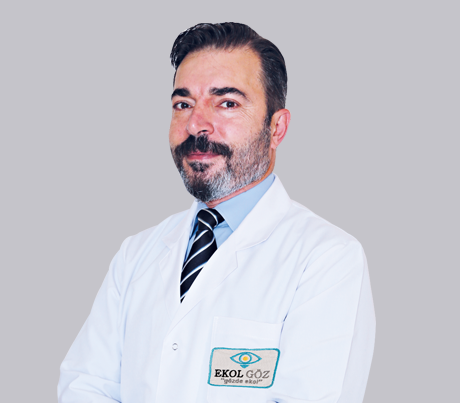 He graduated from Dokuz September University Faculty of Medicine in 1996. He completed his specialized education in the Department of Ophthalmology of the Faculty of Medicine of the Aegean University between 1996-2001 and earned the title of ophthalmologist Dec. He has published numerous scientific articles that fall into international scientific indexes. There are numerous oral and poster presentations to national and international scientific meetings. He is an active member of the Turkish Ophthalmology Association (Tod). He speaks good English, Opr. Dr. Uğur Karagöz is the father of 2 children. Special interests: Cataract surgery (multifocal, trifocal, Toric intraocular lenses) Cataract surgery with laser (Femtosecond Laser Cataract) Excimer laser surgeries (Lasik, Lasek, PRK) Medical and surgical Retina Eyelid Surgeries
He graduated from Dokuz September University Faculty of Medicine in 1996. He completed his specialized education in the Department of Ophthalmology of the Faculty of Medicine of the Aegean University between 1996-2001 and earned the title of ophthalmologist Dec. He has published numerous scientific articles that fall into international scientific indexes. There are numerous oral and poster presentations to national and international scientific meetings. He is an active member of the Turkish Ophthalmology Association (Tod). He speaks good English, Opr. Dr. Uğur Karagöz is the father of 2 children. Special interests: Cataract surgery (multifocal, trifocal, Toric intraocular lenses) Cataract surgery with laser (Femtosecond Laser Cataract) Excimer laser surgeries (Lasik, Lasek, PRK) Medical and surgical Retina Eyelid Surgeries 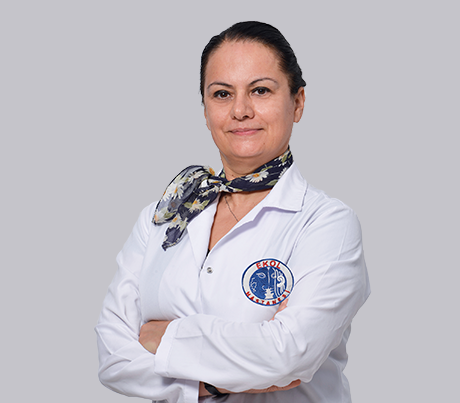 Born in Cyprus Serdarlı, he graduated from Nicosia Turkish High School. He graduated from Dokuz Eylul University Faculty of Medicine. He completed his specialization in Atatürk Health Site Yeşilyurt State Hospital with his thesis on the comparison of the rear camera lens application and the front camera lenses, which was started to be applied for the first time in the clinic under the management of Zühal Çakırca, the clinical chief. She worked as a contact lens center in İzmir for three years and then as chief physician at Karşıyaka Kızılay Fatma Kutluay Dispensary. He continued to work in Karşıyaka by establishing the Private Yalı Polyclinic in 2005 and the Private Yalı Eye Health Branch Center in 2007, his special interests are refraction and contact lenses. He is a member of the Turkish Ophthalmology Association.
Born in Cyprus Serdarlı, he graduated from Nicosia Turkish High School. He graduated from Dokuz Eylul University Faculty of Medicine. He completed his specialization in Atatürk Health Site Yeşilyurt State Hospital with his thesis on the comparison of the rear camera lens application and the front camera lenses, which was started to be applied for the first time in the clinic under the management of Zühal Çakırca, the clinical chief. She worked as a contact lens center in İzmir for three years and then as chief physician at Karşıyaka Kızılay Fatma Kutluay Dispensary. He continued to work in Karşıyaka by establishing the Private Yalı Polyclinic in 2005 and the Private Yalı Eye Health Branch Center in 2007, his special interests are refraction and contact lenses. He is a member of the Turkish Ophthalmology Association. 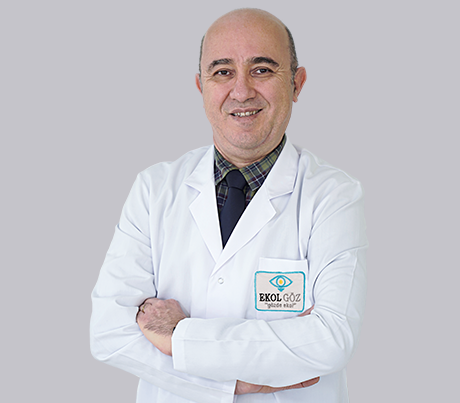 He graduated from Ege University Faculty of Medicine in 1989. Specialization he completed his education in Izmir Education and Research between 1991-1994. He completed his Ophthalmology Department at the Hospital. International A large number of scientific articles included in scientific indexes have been published. Numerous oral and poster presentations to national and international scientific meetings has a presentation. He is an active member of the Turkish Ophthalmology Association (TOD). Fluent in English, Opr. Dr. Gazi Duman is married and has two children. Special interests: Cataract Surgery (multifocal, trifocal, toric intraocular lenses) Cataract Surgery with Laser (Femtosecond Laser Cataract) Excimer Laser Surgery (Lasik, Lasek, PRK) Medical and Surgical Retina Eyelid Surgery Strabismus Surgery
He graduated from Ege University Faculty of Medicine in 1989. Specialization he completed his education in Izmir Education and Research between 1991-1994. He completed his Ophthalmology Department at the Hospital. International A large number of scientific articles included in scientific indexes have been published. Numerous oral and poster presentations to national and international scientific meetings has a presentation. He is an active member of the Turkish Ophthalmology Association (TOD). Fluent in English, Opr. Dr. Gazi Duman is married and has two children. Special interests: Cataract Surgery (multifocal, trifocal, toric intraocular lenses) Cataract Surgery with Laser (Femtosecond Laser Cataract) Excimer Laser Surgery (Lasik, Lasek, PRK) Medical and Surgical Retina Eyelid Surgery Strabismus Surgery 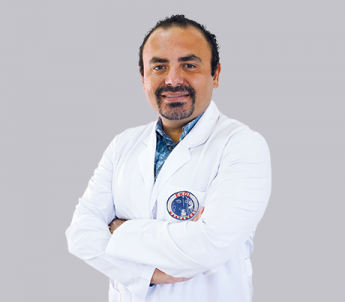 He graduated from Dokuz September University Faculty of Medicine in 2005. September 2005-2010, he completed his specialty education in the Department of Ophthalmology of the Faculty of Medicine of Dokuz Eylül University and earned the title of ophthalmologist. Dec. He has published a large number of scientific articles that have entered international scientific indexes. There are many oral and poster presentations to national and international scientific meetings. He is an active member of the Turkish Ophthalmology Association (TOD), the American Academy of Ophthalmology Association and the European Society of Cataract and Refractive Surgeons. He won the European Ophthalmology Qualification Exam (European Board of Ophthalmology) and became a FEBO. Opr, who is married and has 1 child. Dr. Hüseyin Aslankara speaks English well. Special interests: Retinal Diseases and Vitreoretinal Surgery Cataract Surgery (multifocal, trifocal, toric intraocular lenses) Cataract Surgery with Laser (Femtosecond Laser Cataract) Excimer Laser Surgeries (Lasik, Lasek, PRK) Strabismus Treatment and Surgery Children's Eye Diseases Eye Pressure (Glaucoma) Treatment and Operations Retinopathy of Prematurity and Its Treatment Eyelid Surgeries
He graduated from Dokuz September University Faculty of Medicine in 2005. September 2005-2010, he completed his specialty education in the Department of Ophthalmology of the Faculty of Medicine of Dokuz Eylül University and earned the title of ophthalmologist. Dec. He has published a large number of scientific articles that have entered international scientific indexes. There are many oral and poster presentations to national and international scientific meetings. He is an active member of the Turkish Ophthalmology Association (TOD), the American Academy of Ophthalmology Association and the European Society of Cataract and Refractive Surgeons. He won the European Ophthalmology Qualification Exam (European Board of Ophthalmology) and became a FEBO. Opr, who is married and has 1 child. Dr. Hüseyin Aslankara speaks English well. Special interests: Retinal Diseases and Vitreoretinal Surgery Cataract Surgery (multifocal, trifocal, toric intraocular lenses) Cataract Surgery with Laser (Femtosecond Laser Cataract) Excimer Laser Surgeries (Lasik, Lasek, PRK) Strabismus Treatment and Surgery Children's Eye Diseases Eye Pressure (Glaucoma) Treatment and Operations Retinopathy of Prematurity and Its Treatment Eyelid Surgeries 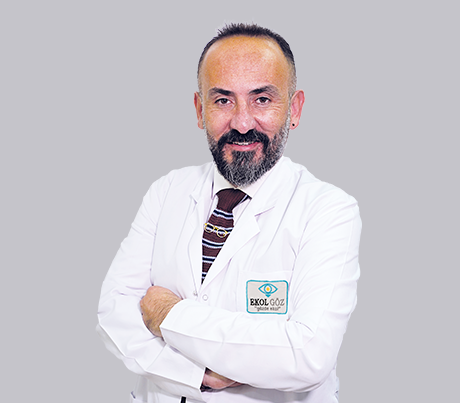 He was born in Nevşehir in 1977. He graduated from Ege University Faculty of Medicine in 2000. He completed his specialization education at Celal Bayar University Faculty of Medicine, Department of Ophthalmology between 2000-2004 and earned the title of ophthalmologist. He is the owner of the Turkish Ophthalmology Board Certificate, which was first given in 2003. A large number of scientific articles that entered international scientific indexes have been published. There are many oral and poster presentations to national and international scientific meetings. He is an active member of the Turkish Ophthalmology Association (TOD). Between 2007 and 2008, Ophthalmology Manual for General Practitioners, Brucellosis in the Etiology of Uveitis and A.O.O.O. There are book translations in Wound Healing Chapters. Op. Dr. Mustafa Alper Çerçi is fluent in English. Special interests: Cataract Surgery (multifocal, trifocal, toric intraocular lenses) Cataract Surgery with Laser (Femtosecond Laser Cataract) Excimer Laser Surgery (Lasik, Lasek, PRK) Medical Retina Eyelid Surgery Strabismus Glaucoma
He was born in Nevşehir in 1977. He graduated from Ege University Faculty of Medicine in 2000. He completed his specialization education at Celal Bayar University Faculty of Medicine, Department of Ophthalmology between 2000-2004 and earned the title of ophthalmologist. He is the owner of the Turkish Ophthalmology Board Certificate, which was first given in 2003. A large number of scientific articles that entered international scientific indexes have been published. There are many oral and poster presentations to national and international scientific meetings. He is an active member of the Turkish Ophthalmology Association (TOD). Between 2007 and 2008, Ophthalmology Manual for General Practitioners, Brucellosis in the Etiology of Uveitis and A.O.O.O. There are book translations in Wound Healing Chapters. Op. Dr. Mustafa Alper Çerçi is fluent in English. Special interests: Cataract Surgery (multifocal, trifocal, toric intraocular lenses) Cataract Surgery with Laser (Femtosecond Laser Cataract) Excimer Laser Surgery (Lasik, Lasek, PRK) Medical Retina Eyelid Surgery Strabismus Glaucoma 










